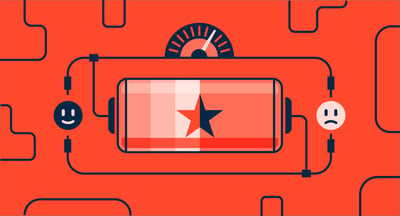

These are terrifying times, both as a professional and as a human being.
We are experiencing unprecedented events as the COVID-19 virus devastates the economy and healthcare systems. It is a human tragedy, the likes of which we haven’t seen in nearly a century.
Over the span of several weeks, entire industries have shuttered. Unemployment skyrocketed with a record 10 million Americans filing for benefits over two weeks. Nearly everyone who can is working remotely, with some adapting to the lifestyle for the first time.
And on top of it all, projections predict that at least 100,000 Americans will not survive the deadly virus.
This reality we find ourselves in is unimaginable.
Yet as leaders, it is our job to prepare for the worst, to not shrink from facing this new, frightening reality.
Yes, these are unprecedented, unpredictable times. But we have survived unprecedented, unpredictable times before. When the future is uncertain, we can look to the past for guidance.
As a leader, you not only have the health of your family to worry about, but you also have the health of your business and your employees top of mind.
As we watch the dire headlines, it is imperative not to panic. While it’s tempting to make drastic cost cuts such as layoffs to buoy the bottom line, these offer a temporary relief that may or may not ensure your company survives.
Every situation is unique, and some of the following options will not apply. But if possible, there are other steps you can consider before making those difficult decisions.
If you refocus your strategy, invest in marketing to your loyal customers, and take care of yourself and your team, you may find ways to navigate this turbulent time.
As leaders search for ways to tighten budgets, be wary of cutting too much from marketing. With the Consumer Confidence Index dropping, it’s more important than ever to be a trusted brand that is attuned to your customers’ needs.
Understanding your customers will involve more market research as your market segmentation strategy changes. Before the COVID-19 crisis, you may have segmented your customers based on lifestyle or demographics; now, you should reconsider through the lens of psychology.
How are your customers reacting emotionally to the changes happening around them? How does it impact their behavior as a consumer?
Harvard Business Review broke down common consumer behavior during economic downturns into these four segments:
HBR also breaks down the different types of products and services that people consume by need:
In these strange times, anything involving human contact is considered expendable. How can you pivot to offer what consumers see as essentials or treats?
This is where market research is critical. Invest in gathering data on your customers’ behavioral trends. Analytics such as which product has decreased the most in sales and who is most active on which channels are valuable insights. Findings from polls and surveys, which are low-cost options, will also help you better understand what your customers need.
Godard Abel, the founder and CEO of G2, and a proven entrepreneur that’s seen businesses through several economic downturns, recalls how his startup BigMachines navigated the recession of the early 2000s.
“We entered our first crisis with only a dozen customers, but we made sure we stayed very close to them and delivered a great product for them.”
Godard Abel
Founder & CEO, G2
This dedication to customers provided the foundation for BigMachine's future success when the demand for cloud computing accelerated a few years later.
Everyone will most likely have to make cuts, but try not to sacrifice your company’s values or value proposition.
For example, if you’re a luxury brand and you slash prices dramatically, you may see an influx of purchases at first. But eventually, you’ll realize you alienated your core customer group that was loyal to you for what you symbolized before this crisis. That can be crippling long-term.
Triage your current products and services. With your customers’ psychological market segments in mind, ask yourself: which of these products will flourish, which won’t survive, and which will suffer but eventually stabilize?
Taking a hard look at your offerings and making cuts based on knowledge about your customers (what they value and what they can afford) is better done sooner rather than later.
Another way you can make painless cost cuts quickly? G2 Track is offering a 90-day free subscription to ensure your business isn’t wasting spend on unused software tools or licenses. Find out how G2 Track can help you increase cost-efficiency today.
Salesforce is a success story entirely built on staying loyal to its brand and its customers.
In 2005, Salesforce was an innovative leader in the CRM space, but few knew it was debilitated by an 8% monthly churn rate. For reference, the average churn rate for SaaS companies is about 4.8% monthly. If it didn’t stop the leak, Salesforce would sink.
Realizing that retaining customers had to become as important as winning new ones, Salesforce adopted customer success as one of its core values: “our customers’ success is our success.”
Despite the Great Recession, Salesforce grew its revenue from $497 million in fiscal 2007 to nearly $1.1 billion in fiscal 2009.
How? Salesforce did not stray from its core values despite the frightening economic climate. The focus on an excellent customer experience, regardless of the size of the deal, paid off big.
They did their market research, paid close attention to their customers, and provided what customers needed. Prospects saw the great experience Salesforce customers received and wanted in on it.
There’s only one Salesforce, but the lesson here is: if you remain loyal to your brand and your customers, you will most likely see some level of success, too.
As scary as it is, you’ll need to abandon your previous criteria for success. Those goals just aren’t feasible anymore, and the sooner your team recognizes that, the better. You made them in an environment that no longer exists, and this economic downturn may last a long time.
Be honest with yourself in setting new, attainable goals in the current climate. Based on those goals, you’ll know what needs to be rearranged in regards to strategy and budget.
“A crisis can be invigorating and create new opportunities if you remain calm, present, and optimistic.”
Godard Abel
Founder & CEO, G2
Make sure you are keeping a pulse on the current realities. With everyone social distancing inside, it doesn’t make any sense to fund certain types of marketing. Event, field, and experiential marketing are not feasible in this environment.
That said, that money and effort can be reallocated to the types of media people will be consuming at home, which are primarily social media, broadcast, and content marketing.
If possible, maintain or increase your advertising budget on these types of media. When looking at over a century of data on how companies that advertise during economic downturns perform compared to how companies that do not advertise, the results are clear: advertising pays off.
B2B companies that advertised aggressively during the 1980s recession saw 275% growth in sales over companies that did not advertise.
Source: McGraw Hill Research
Even while you refocus and pivot, you should adopt a future-back strategy. What do you want the company to look like at the end of this economic downturn? Three years from this economic downturn? As best you can, try to make decisions with that vision in mind.
Godard recommends encouraging your team to bring forth new, innovative ideas. This ensures that when the upturn comes and consumers are ready to try new things, your company will be prepared to meet them. It’s also a great way to accelerate professional growth among your team as individuals step up to lead in times of crisis.
What is happening right now is a human tragedy.
We cannot forget the human element of this – the trauma, the grief. It’s so important to be mindful and to follow these three pillars of strength.
Take care of your customers. Right now many people value affordability, connection, and safety. As a brand, as a human, ask yourself how you can help. Do away with penalty and adoption charges. Offer new subscription options or unbundle your offerings so people can pick and choose. Send thoughtful messaging in your email newsletters and on your social media accounts.
A great example of putting your customers first during difficult times is Hyundai’s Assurance program during the 2008 recession. It provided customers the opportunity to return a purchased or leased car if they lost their income within a year of sale.
Hyundai is reprising the program for those impacted by the current economic crisis, offering to make up to six months of payments for new owners who purchase or lease a car between March 14 and April 30, 2020.
Related: Find out how real customers of G2 Track used our SaaS spend tool to cut costs during COVID-19.
Take care of your team. Let them know you think of them all the time. Be as transparent with them as possible in regards to the business’ health – they deserve that. And if you have to make the tough, heart-wrenching decision to let part of your team go, it’s crucial your remaining team members feel you’re full of love and care for their well-being.
Take care of yourself. As an entrepreneur and CEO, this is Godard’s biggest piece of advice to other leaders because it is often easy to overlook. Be in tune with how you're doing mentally, physically, and spiritually. It's important to be more present and conscious than ever.
“Taking care of yourself and being present enables you to effectively lead your business and family through uncertainty to a better place.”
Godard Abel
Founder & CEO, G2
The COVID-19 crisis will change the world as we know it. How exactly remains to be seen, but we are all in this together, as professionals and as a community.
There’s no doubt that difficult times are ahead of us. While this article is optimistic, this downturn is unlike any other we’ve experienced in recent history and can only be compared to the past so much.
Everyone will experience different situations and strife. I hope this article helped in at least one small way.
I’d like to leave you with this quote from John F. Kennedy that Godard sent to the G2 family. We’ve all been using it as a source of hope and inspiration.
“The Chinese use two brush strokes to write the word 'crisis.’
One brush stroke stands for danger; the other for opportunity.
In a crisis, be aware of the danger – but recognize the opportunity.”
John F. Kennedy
35th U.S. President
If you’re interested in more in-depth SaaS marketing advice, check out our B2B Software Marketing Playbook specifically for the COVID-19 crisis.
Holly is the director of content marketing at G2. An avid reader and writer, Holly graduated from the University of Missouri with a dual major in Journalism and English. She firmly believes in the power of content and is constantly seeking ways to better engage and delight readers.
The products we buy, adventures we experience, the food we eat - there is a digital platform...
 by Gina Carr
by Gina Carr
Remember when Google’s search results page featured nothing more than links and meta...
 by Mac Mischke
by Mac Mischke
Take a moment to think about some things you can do in 60 seconds.
 by Jeremy Rembulat
by Jeremy Rembulat
The products we buy, adventures we experience, the food we eat - there is a digital platform...
 by Gina Carr
by Gina Carr
Remember when Google’s search results page featured nothing more than links and meta...
 by Mac Mischke
by Mac Mischke
Never miss a post.
Subscribe to keep your fingers on the tech pulse.



